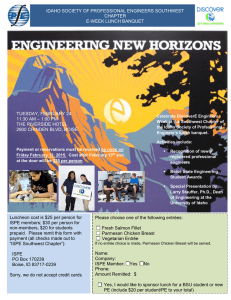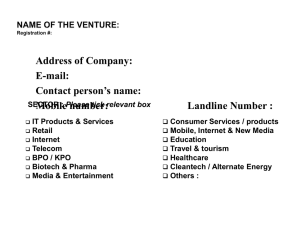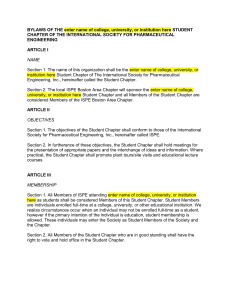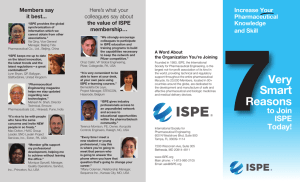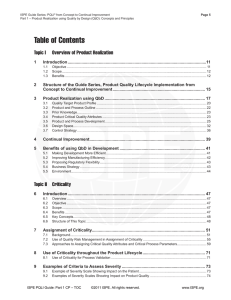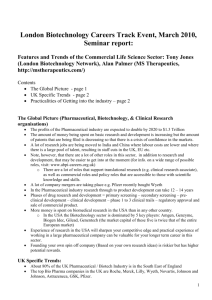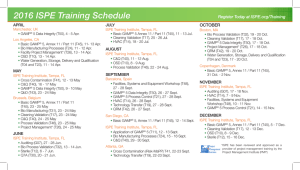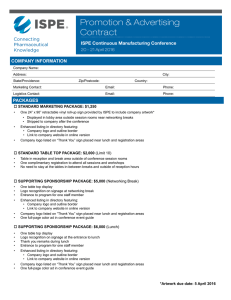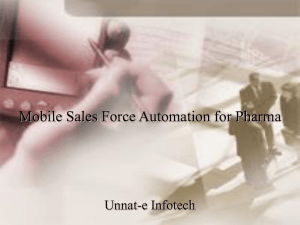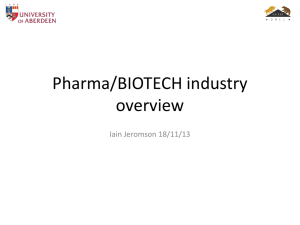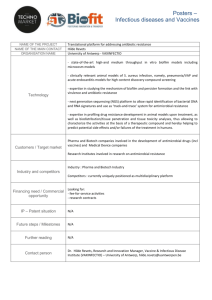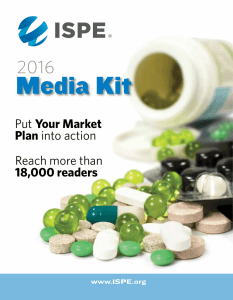Industry Interview Series: John Honey, Associate Director of
advertisement
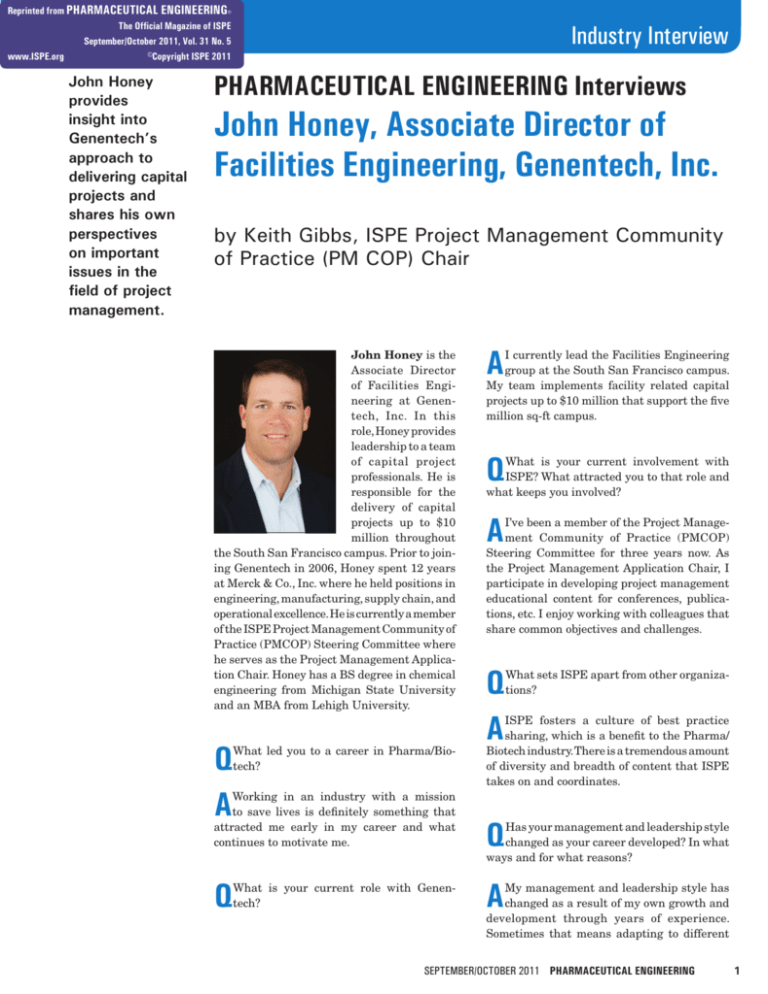
Reprinted from PHARMACEUTICAL ENGINEERING® The Official Magazine of ISPE September/October 2011, Vol. 31 No. 5 www.ISPE.org ©Copyright ISPE 2011 John Honey provides insight into Genentech’s approach to delivering capital projects and shares his own perspectives on important issues in the field of project management. Industry Interview Pharmaceutical Engineering Interviews John Honey, Associate Director of Facilities Engineering, Genentech, Inc. by Keith Gibbs, ISPE Project Management Community of Practice (PM COP) Chair John Honey is the Associate Director of Facilities Engineering at Genentech, Inc. In this role, Honey provides leadership to a team of capital project professionals. He is responsible for the delivery of capital projects up to $10 million throughout the South San Francisco campus. Prior to joining Genentech in 2006, Honey spent 12 years at Merck & Co., Inc. where he held positions in engineering, manufacturing, supply chain, and operational excellence. He is currently a member of the ISPE Project Management Community of Practice (PMCOP) Steering Committee where he serves as the Project Management Application Chair. Honey has a BS degree in chemical engineering from Michigan State University and an MBA from Lehigh University. Q A What led you to a career in Pharma/Biotech? A I currently lead the Facilities Engineering group at the South San Francisco campus. My team implements facility related capital projects up to $10 million that support the five million sq-ft campus. Q What is your current involvement with ISPE? What attracted you to that role and what keeps you involved? A I’ve been a member of the Project Management Community of Practice (PMCOP) Steering Committee for three years now. As the Project Management Application Chair, I participate in developing project management educational content for conferences, publications, etc. I enjoy working with colleagues that share common objectives and challenges. Q A What sets ISPE apart from other organizations? ISPE fosters a culture of best practice sharing, which is a benefit to the Pharma/ Biotech industry. There is a tremendous amount of diversity and breadth of content that ISPE takes on and coordinates. Working in an industry with a mission to save lives is definitely something that attracted me early in my career and what continues to motivate me. Q Q A What is your current role with Genentech? Has your management and leadership style changed as your career developed? In what ways and for what reasons? My management and leadership style has changed as a result of my own growth and development through years of experience. Sometimes that means adapting to different September/October 2011 PHARMACEUTICAL ENGINEERING 1 Industry Interview individuals, team members, and organizational cultures to inspire and find effective ways to motivate and get the most out of a team. It doesn’t change who I am or what I believe in. Simply having flexibility in the approach. Q What are your biggest concerns for the future of the Pharma/Biotech industry – if any? A As an industry, we are facing tremendous financial pressures. Although healthcare coverage in the U.S. is still under debate, we in the Pharma/Biotech industry should prepare ourselves to deliver our medicines to a wider patient base without adding costs. The expectation to operate our business more efficiently is higher than ever. Q If you were to devise a “mantra” that industry could use in regard to its approach to Project Management, what would that be? A Project Management is a service that is provided to the business/ industry that we serve. Our customers are typically those that discover, develop, manufacture, and market lifesaving medicines for patients. Project Management services can be thought of as an enabler of our industry. Successful Project Management translates to success for our customers and their ability to deliver on their business commitments. Q A How would you define the value of Project Management? Project Management includes so many components that it is often difficult to summarize value or criticality. That said, I define the value of Project Management as managing all attributes of a project or initiative, balancing the critical components, and making appropriate trade-offs when required. The key is to understand the business objectives and the customer expectations and coordinate the project 2 in such a way that it completely fulfills these two requirements. Q A What are your views on managing a successful project? A project is successful if the value defined above is maximized. If a project meets or exceeds the business objectives and customer expectations, then success is achieved. We often talk about meeting scope, schedule, and budget as key success criteria and yes those are important. But if you miss the business objective or the functionality of the project does not meet the customer’s expectations, then it’s hard to claim success. Q How can government, academia, and ISPE work with the industry to help address some of these concerns and also provide excellence in training, education, and knowledge to advance the Pharma/Biotech industry? A Currently, there is a lot of content available through organizations such as ISPE that is broadly targeted to individuals and organizations throughout the Pharma/Biotech industry. In addition to the current approach, it would be helpful to develop material that targets leaders in the industry who are decision makers for their organizations and can influence change. This targeted audience can take best practice material back to their organizations and incorporate into their business systems. By taking this approach, best practices can be implemented in a systematic way throughout industry and have a wider spread benefit. Q What are some of the biggest risks in biotechnology projects that face a Project Manager? A Projects implemented in the cGMP environment carry the highest level of risk. Any impact to the cGMP environment can have significant consequences to the downstream supply chain. That’s why there is so much rigor PHARMACEUTICAL ENGINEERING September/October 2011 put around these projects and why we have more robust project requirements, deliverables, and governance in the cGMP area. Q What are the advantages to putting in place a scalable project delivery process? Describe what is in place at Genentech. A A one-size fits all process for project delivery has its limitations. No two projects are exactly alike in terms of scope, complexity, business drivers, cost, etc. So whatever the approach to project delivery, there needs to be flexibility and scalability. At Genentech, we have taken the approach to put separate processes in place – one to execute projects that are greater than $10 million and one to implement projects that are less than $10 million. The less than $10 million process is essentially a framework that provides a structured approach to implement projects ranging from $50,000 to $10 million. There are required and recommended deliverables at one or more stage gates that can be tailored to meet the needs of the project based on complexity and risk. Q What are some of the key metrics used in your organization to gauge project performance or success? A We use the traditional adherence to budget and schedule to monitor the overall health of projects and the portfolio. We also evaluate cycle time, contingency management, and portfolio resource efficiency. Moving forward, we will be putting in place a more robust measurement system that measures a combination of quantitative and qualitative measures, such as customer service and relationship management to ensure a more holistic gauge of performance and success. Q Do you think that having project standards for equipment, instrumentation, and test methods will result in reduced capital costs and project delivery timelines? Industry Interview “By continuing to streamline our project delivery model, we will help drive value in capital spend today and mitigate depreciation expenses tomorrow.” A Absolutely. Standardization drives efficiency by removing repeatable work from the process. For instance, the IQ and OQ for an autoclave should have similar elements that can be utilized from project to project. If the project team does not have to re-invent the similar elements for each project, work has been removed from the process translating to reduction in capital costs and schedule. Of course, the challenge is to identify the right level of standardization since although there are similar elements across projects, there are also very different elements – no two projects are exactly alike. Q What is your definition of Operational Excellence (OE) and how have you applied it? A Operational Excellence is the application of continuous improvement in a structured, disciplined way that ensures sustained improvements and results. The key here is sustainment of the improvement. There are a lot of good ideas that come from all parts of the organization and a lot of effort is spent designing and implementing those ideas. Successful OE projects or initiatives are those that are fully operationalized and become part of the everyday business process. For example, we’ve established effective project delivery processes using simple OE techniques and tools, such as Suppliers-Inputs-Process-OutputsCustomers (SIPOC), Responsible-Accountable-Consulted-Informed (RACI), and process mapping. A system is in place to measure and report on “project health,” which ensures that projects adhere to the process and consistency is sustained over time. As these measures are rolled up across the portfolio, we begin to understand where there are opportunities for improvement. A commonly used lean tool called “Kaizen” (which means “change for the better”) is employed to implement improvements quickly. A successful Kaizen includes a control plan to ensure that the change sticks. We’ve successfully applied Kaizen techniques to reduce project cycle time, drive efficiency into the project close-out process, and improve project contingency utilization. Q What do you see as emerging methodologies in Project Management? What are you implementing? A Q Putting more focus in managing outcomes as opposed to the task. Performance based management is an emerging concept in the project delivery sector. The Facilities Management industry has successfully implemented these concepts and I believe that there are elements of this philosophy that can be successfully applied in the project delivery service model. A Q What primary business initiatives are you focused on in your current role? The way my current organization is structured, nearly all project management and project execution activities are outsourced. My team and I are looking to transform the current outsourcing approach into a turn-key project delivery model that incorporates performance based contracting concepts. This new approach will translate into a streamlined project execution and contracting system that will allow my internal team to focus more on aligning the capital portfolio to the business objectives. Q What are some of the concerns or issues you have today in your operations? What kind of improvements do you think that you can make to mitigate those concerns? A The current financial climate brings focus to how we direct our capital investments and to ensure that the value of our capital spend is maximized. Capital spending has long-term impacts – a capital investment today translates into future depreciation expenses. By continuing to streamline our project delivery model, we will help drive value in capital spend today and mitigate depreciation expenses tomorrow. Do you have any advice or recommendations for current or future Project Managers? A Project Management is such an exciting field because every new project brings a new set of challenges and opportunities. It never gets old, unless you let it. My advice is to not be complacent in how to approach your projects. Look for better ways to accomplish the goal. No matter how much process, requirements, deliverables are out there, it still boils down to the people doing the work. The Project Manager has the opportunity to be innovative on every project in how to use those processes, tools, etc. Maximize the value you provide! Q Is there anything else that you might want to say to our readers? Any last thoughts on the industry you serve? A I think that despite all the challenges that our industry faces, we will continue to innovate, become more efficient, and ensure that we continue to deliver life-saving medicines to the patients we serve. Stay tuned because the best is yet to come! September/October 2011 PHARMACEUTICAL ENGINEERING 3
